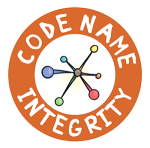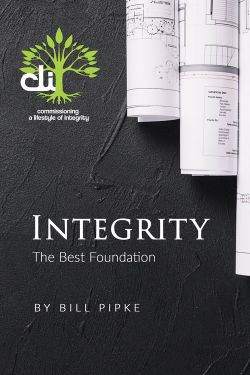Authenticity - Part 1 Session 1
Welcome to Integrity: The Best Foundation, the book and video series designed to help you live and lead with integrity.
Know who you are.
In my travels around the world, I have visited street markets selling sports jerseys, brand name clothing, sunglasses, artwork, jewelry. And when I stop at these markets, I expect that most of the products are imitations. Some copies are very good and some are humorously bad. I like to ask the vendor, "Are these genuine?" Most of the time they just kind of smile back at me.
In some cases, I've noticed that the vendor has a little sign certifying that they are a government-approved store. Yet, in the back of my mind, I sometimes have this nagging thought: "Could their certificate be a forgery?"
Sometimes people who are unconventional or outspoken are hailed as authentic. Such people semi-defiantly voice unorthodox opinions. Others attempt to express who they are through how they dress. So, does unfiltered behaviour or unique fashion guarantee authenticity? Flamboyance may reflect a style, but it is not necessarily an expression of authenticity. It could be just the opposite.
Most of us have posted a selfie. After taking a picture with your cell phone, you filter it with an app; you re-image your picture before you post it. You want to filter it against blemishes, soften the tones, adjust the brightness, even take away the red eyes or remove a double chin. And when you send a message, we also are image-conscious. We concern ourselves with the right hashtag. We want to present ourselves as smart, but not too clever. It needs to be right, but we don't want to look like we're working too hard. Some people even hire an image coach.
Superficial and pretentious living blurs the perception of who we are and dulls our sense of purpose. Shakespeare's Polonius in the play Hamlet gives sage advice to his son. He says, "To thine own self, be true." The words of Polonius imply that someone can better judge himself if he is honest about what he has done. The second meaning is that one must be honest in their relationships. The third meaning is, one must do the right thing. Polonius understood that before you can be true to others, you must first be true to yourself. It's another way of saying, "Love your neighbour as you love yourself." It's impossible to love your neighbour if you don't love yourself. So, being true to your own self is the true north of living and leading with integrity. A lack of self awareness is both disorienting and disconcerting.
Now, charisma without good character cannot sustain success. Life and leadership demand authenticity, and leaders who are genuine will attract good followers. They're able to develop strong teams. Remember, people around you are not just listening to you. They want to watch how you live.
Now, every street market imitation is exposed over time and examination. Copied products fail to meet the expected standard of the original. And the same principle applies to how we live. Knowing who we are matters. You are the message. You are the company. You are the church. You are the team.
Now, being genuine furnishes direction and creates a culture of trust in your organization. It's the north star of your purpose. And if you can lead yourself, you are more likely able to be successful in leading others. If people believe you are sincere, they will trust you. They will adopt your direction. However, if you fail to lead yourself then your team members won't be certain of your direction, and you will rob them the joy of placing their confidence in you. An authentic person stands taller, thinks more clearly, and cares more deeply. And that, in turn, empowers those around them to do the same.
So how can you follow the north star of who you are and become who you want to be? How can you determine your true purpose in passion? Well, let me give you five thoughts:
First, write down your personal heart, dream, and ambitions. Now start. You may need to revise it a couple of times.
Then, set your priorities.
Thirdly, work on your plan. Be intentional.
Fourthly, get some feedback. It helps to get some who will assess your strengths and weaknesses.
And finally, invite input from trusted friends. Or find a coach.
Being true to who you are gives direction, and it's the north star of living and leading with integrity.
So here's our group question to begin to discuss:
If we knew we had a thousand days to live, how would we change the way we live? And why?




